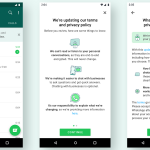The UK will phase out 2G and 3G mobile services by 2033 to release radio waves for 5G and 6G, the government has announced.
Culture Secretary Nadine Dorries said: “5G technology is already revolutionising people’s lives and businesses – connecting people across the UK with faster mobile data and making businesses more productive.
“Today we are announcing a further £50m to put the UK at the forefront of mobile connectivity and to make sure our telecoms networks are safe and secure now and in the future.”
The funding, announced ahead of a meeting with her US counterpart later on Wednesday, will be for Open Radio Access Networks (Open RAN) projects.
She added that setting a date for the end of 2G and 3G will make it easier for new equipment makers to enter the market, because they will not have to support the older technologies.
The government wants to end the country’s reliance on a small number of suppliers, after China’s Huawei was banned from new networks last year.
All four networks – EE, Vodafone, O2 and Three – have agreed to the timetable, they said.
Amazon server outage leads to problems with several web services, including Disney+, Ring and Prime
SPAR: Supermarket chain confirms ransomware attack has forced stores to close
Grimsvotn: Iceland raises alert level for eruption of its most active volcano
BT, which owns EE, said in July that it will phase out 3G by early 2023, followed by 2G, which is more than 25 years old, later in the decade.
Hamish MacLeod, director of industry body Mobile UK, which represents all the major UK networks, said it welcomed the decision.
“Switching off 2G and 3G will enable operators to transition fully to more energy-efficient and high capacity networks to the benefit of customers,” he said.






















